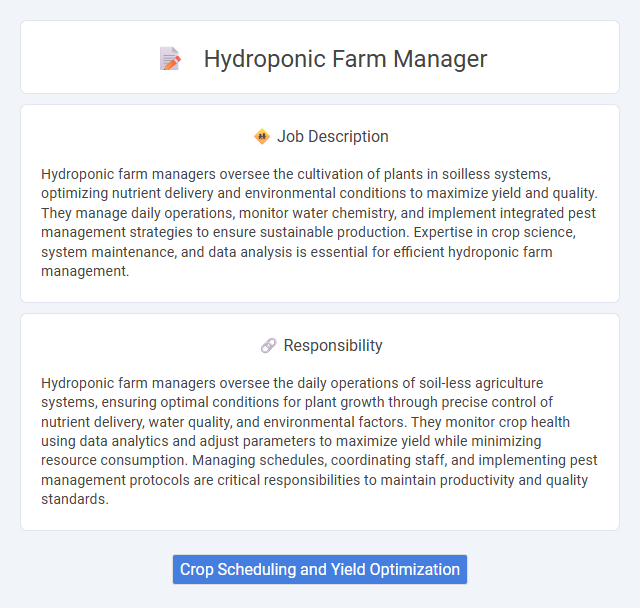
Hydroponic farm managers oversee the cultivation of plants in soilless systems, optimizing nutrient delivery and environmental conditions to maximize yield and quality. They manage daily operations, monitor water chemistry, and implement integrated pest management strategies to ensure sustainable production. Expertise in crop science, system maintenance, and data analysis is essential for efficient hydroponic farm management.
Individuals with a strong interest in agriculture and technology are likely to find the role of a hydroponic farm manager suitable. Those who enjoy working in controlled environments and possess problem-solving skills may have a higher probability of thriving in this job. Candidates who prefer outdoor, physically intensive work might find hydroponic farming less suitable due to its indoor and technical nature.
Qualification
A Hydroponic Farm Manager must possess a strong background in horticulture or agricultural science, along with hands-on experience in hydroponic systems management. Proficiency in monitoring nutrient solutions, environmental controls, and pest management is essential to optimize plant growth and yield. Advanced skills in data analysis, problem-solving, and team leadership contribute to efficient farm operations and sustainable production.
Responsibility
Hydroponic farm managers oversee the daily operations of soil-less agriculture systems, ensuring optimal conditions for plant growth through precise control of nutrient delivery, water quality, and environmental factors. They monitor crop health using data analytics and adjust parameters to maximize yield while minimizing resource consumption. Managing schedules, coordinating staff, and implementing pest management protocols are critical responsibilities to maintain productivity and quality standards.
Benefit
Hiring a hydroponic farm manager will likely improve crop yield and resource efficiency due to their expertise in controlled environment agriculture. The manager probably reduces operational costs by optimizing water, nutrients, and energy use, leading to sustainable production practices. Their knowledge of pest management and plant health monitoring is expected to enhance overall crop quality and minimize losses.
Challenge
Managing a hydroponic farm might involve navigating challenges such as maintaining optimal nutrient levels and ensuring precise environmental control to promote plant growth. There is a probability of encountering issues related to pest management and disease prevention in a soilless system, which can impact crop yield. Consistently adapting to technological advancements and troubleshooting system malfunctions could also pose ongoing difficulties for a hydroponic farm manager.
Career Advancement
Hydroponic farm managers gain expertise in controlled environment agriculture, plant nutrition, and crop management, positioning themselves for leadership roles in sustainable farming and agritech industries. Mastery of advanced hydroponic systems and data-driven irrigation techniques enhances opportunities for senior management, operations director, or consultancy positions. Career advancement is also accelerated by certifications in agricultural technology and experience with scalable farm automation solutions.
Key Terms
Crop Scheduling and Yield Optimization
Hydroponic farm managers utilize advanced crop scheduling techniques to maximize growth cycles and enhance resource allocation, ensuring continuous production of high-quality crops. By analyzing environmental data and plant growth patterns, they optimize nutrient delivery and light exposure to boost yield efficiency and reduce crop stress. Strategic planning of planting and harvesting intervals directly contributes to increased output and profitability in controlled environment agriculture.
 kuljobs.com
kuljobs.com